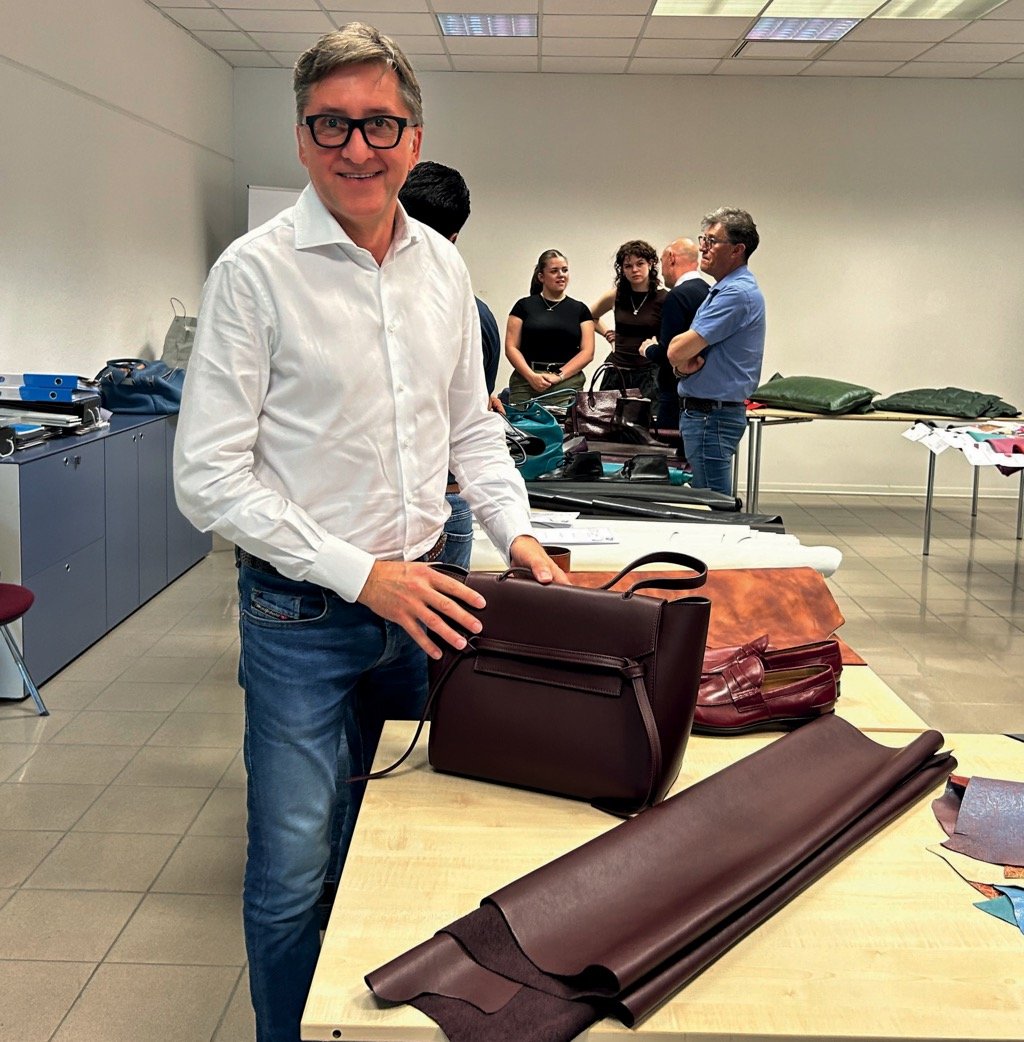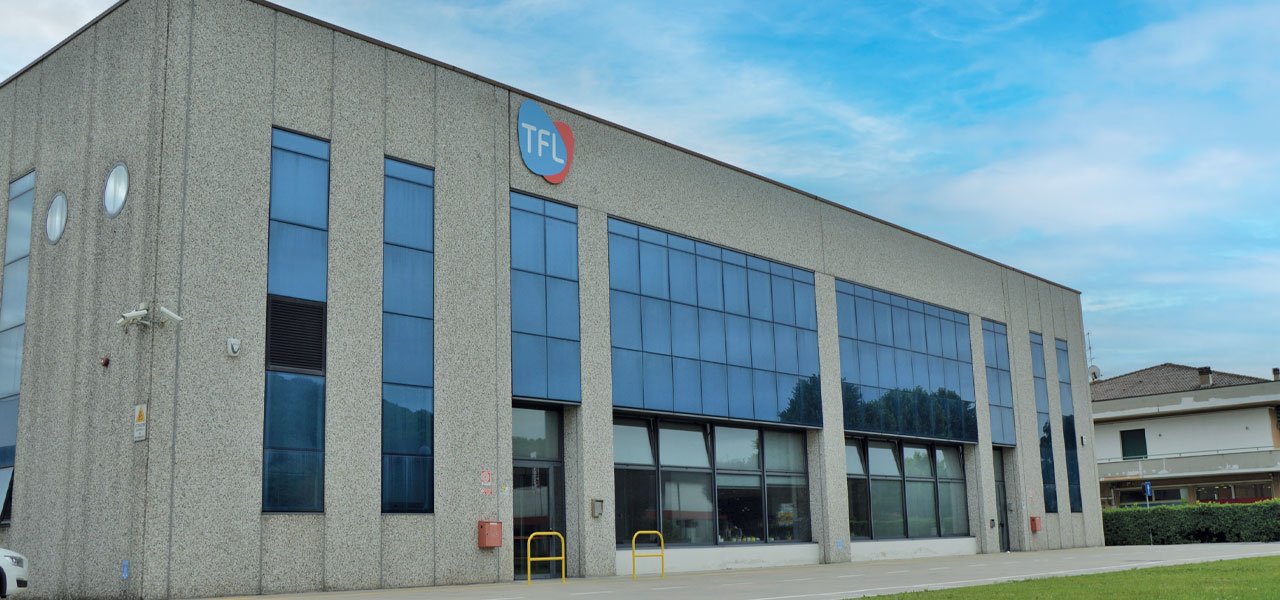The international group presented its new collections for fall-winter 2025-2026 between May and June. The Montebello headquarters hosted faculty and students from the Institute for Creative Leather Technologies at University College, Northampton, England.
TFL Italia proves to be an international leader in not only being ahead of the times in collections but also in educating students throughout the world. The multinational chemical company operates in numerous locations around the world, and in Italy it has a fundamental center of production, research and development for the leather industry and the businesses in the sector. The company offers its innovative products and solutions to tanneries, leather processors and coaters, continually producing new technological solutions and trends, with great attention to environmental dynamics. Business activities include the development, production and marketing of specialty chemicals such as tanning agents, dyes and finishing products, which enable clients, mainly tanneries, to create end items with high added value. TFL has “business units” in every major tanning cluster around the world. To date it is actively present in 90 countries either with the support of exclusive agents and distributors or through local application centers, laboratories or customer service centers. Production sites in Brazil, France, India, China and Italy ensure proximity to supply chain customers, a comprehensive global network to provide the tanning industry with optimal supply and service conditions.
In Italy there are two main offices of the group, located in two different leather districts: in Tuscany, in Castelfranco di Sotto (Pisa), which hosts the Global Fashion Centre TFL which is the global center dedicated to footwear and leather goods. As well as in Veneto, in Montebello Vicentino (a municipality that belongs to the tanning pole of Arzignano) where a full-scale tannery is located, offering the complete cycle from wet to finished, as well as headquarters dedicated to research for furniture and automotive. It was precisely in Montebello, in the last part of May, that for a week two professors met with a large group of students from the Institute for Creative Leather Technologies (ICLT). From the English city of Northampton, with almost 250,000 inhabitants, the University College were guests and met with managers and technicians from the Vicenza branch of TFL and other branches located in Europe. The students were divided into three groups, while presentations, demonstrations and visits to other companies took place in groups.
“In collaboration with the University of Northampton, with which there has been more than a 20-year relationship,” explains Mauro Magnaguagno, manager and head of the Montebello Vicentino office, whom we interviewed on the occasion of the presence of the English students, “this year we were able to associate the visit, which usually takes place between the end of May and the beginning of June, when the classes of the academic year end with the presentation of the collection. We thought it would be interesting for them, since their studies are related to fashion, design, as well as leather, to have this experience that allows for each product to appreciate the differences in hand feel and origins. From the very first day, the students realized the great opportunity and immediately thanked us.”
When was this project created?
“The collaboration with the University of Northampton began in 2001 from a need of theirs to have an education more in contact with the tanning industry, also due to the fact that the university is not located within a specific leather district, as is the case with our setting in Montebello Vicentino. Since the early 1990s we have been an active part in promotional and teaching activities within the university, organizing, once a year, week-long trips to Northampton, where TFL specialized technicians would go for training. After a few years, our proposal was to suggest that they come to us, also for the possibility of engaging with the production activity in place, as well as being able to visit and view local companies in the district.”
How was the week organized for the Northampton undergraduates?
“It should be said right away that this is not a bonus vacation, but rather a period, although short, of intense and demanding work: in fact, lectures, presentations and discussions are planned both in the morning and in the afternoon, with a short break for lunch inside our dining hall that we have equipped through a catering company. Also planned, as has been the case in the past, are a series of visits to important Vicenza industries
in the sector, including Officine di Cartigliano, Gemata di Trissino and Erretre di Arzignano, which take place by traveling with a small bus of about 15 seats. In previous years we have been able to organize tours to the headquarters and related facilities of Acque del Chiampo in Arzignano, a very important entity from an environmental and land conservation point of view.”
At the training level, the TFL Group has been a pioneer in training young people …
“That’s right. Particularly at the level of student education and orientation, as well as relationships with companies and universities, we were among the very first ever. At a time when in Italy there is an insistent return to talk about alternating school-work, with the Italian government working in this perspective, also in order to comply with European standards) the TFL Academy was opened in 2000, even before the “Moratti Reform” (named after Minister Letizia, first instituted in 2003, ed.), although in reality the collaboration with the Galilei Institute of Arzignano dates back to the 1980s and 1990s.”
Why this strategic choice?
“Mainly because in 2000 we had launched the TFL Academy precisely for the purpose of training specific figures within our group and then being supportive to clients by organizing specific workshops. At the same time as an institutional activity, we wanted to be supportive of the schooling of future recruits. We are aware that we have paved a way, later followed by other economic realities, and we believe that we were among the first ever in the leather sector to invest in young people.”
What does the partnership with the University of Northampton consist of?
“Welcoming their students for a week and carrying out a series of in-depth training and demonstrations on site, where our research and development department has a real modern tannery, and from a program of visits to companies in the district. These trainings play an active role in training the next generation of technicians in a European context: in addition to the English university, this was done with an institute in Reutlingen, a German city of nearly 120,000 inhabitants, and with Itech Lyon, the textile and chemical institute in Lyon, France. Particularly in the agreement with Northampton we found fertile ground, finding ourselves very much aligned with the strategies and the desire on the part of the faculty to learn about the Italian tanning industry. The students move willingly, also because by involving certain sections from year to year there is a rotation, while for the professors repeating the experience every late spring could become challenging: instead we have always found maximum readiness in this sense.”
What is the thing you are most proud of as part of the project?
“The fact that there are English students who, after getting to know our company and attending it on an ongoing internship level, are now part of our company staff, which here in Montebello is composed of 45 technicians, almost all of whom are chemistry graduates or high school graduates. However, it also happened that students from the Chiampo Valley, after graduating, decided to attend English university, and once they graduated they returned home, to be immediately hired by companies in our district. In other words, a double “channel” was created between Italy and England, ontributing to the training of young tanners, who were then placed in the world of work. This is a virtuous project that has led us to invest many resources, but we strongly believe in the importance of such collaborations between the worlds of industry and education.”
What, on the other hand, are relations with institutes in the Vicenza area?
“We believe that the commitment to support local schools represents a help for the entire valley, which over the decades has industrialized, strengthening itself around the leather sector. We believe a lot in training, which is why since the last century there has been a collaboration with the tanning institute of Arzignano. The Its
“Galileo Galilei” and the Its Green Leather Manager course: due to questions of proximity, these are easier initiatives to implement, with our technicians going to school for lessons, bringing the experience of the working world, but also courses organized in our Montebello headquarters, through the performance of specific activities with the use of hides and machinery used and inserted in the production cycle. The last project carried out ended in the spring of this year: it was a practical post-diploma course for those who attended the Green Leather Manager focused on leather and furniture, which included internships in the company with speakers from our technicians.”
How do you rate the attention of students to the various initiatives?
“Always convincing, this confirms that we are on the right track. All students and new graduates show interest and attention, but you can also see it in the conferences organized in and around Arzignano, outside school hours, often in the evening or on weekends: usually these are events for technicians and insiders, instead our young people are present and do it with conviction, an absolutely important aspect. Summer internships are also very effective; they are essential for students to experience the business reality, improving their cultural background and putting into practice what they learned during their schooling.”

Mauro Magnaguagno

